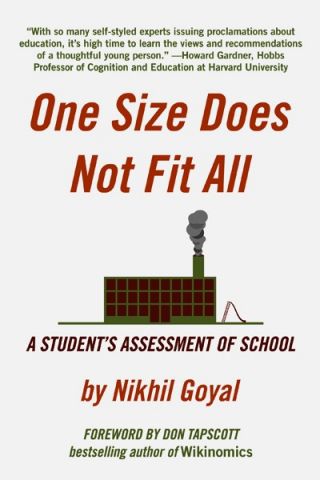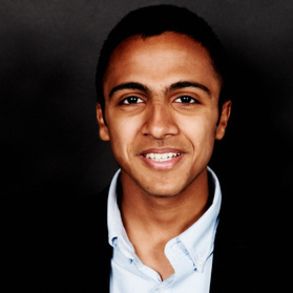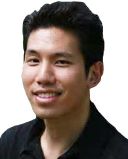Education
Nikhil Goyal: Future US Secretary of Education?
A conversation with Nikhil Goyal, author of One Size Does Not Fit All
Posted December 16, 2012

Nikhil Goyal is an amazing seventeen year old. He has already written a book titled One Size Does Not Fit All which is endorsed on the front cover by Howard Gardner. He has been named a future secretary of education by Diane Ravitch in The Washington Post. And he is already making speeches and writing articles that reach people all over the world.
One day I received an email from Nikhil asking if I might be interested in reading his book. I asked him to send me a copy and said I’d be delighted to read it carefully and get back to him. What follows is the transcript of our conversation over email.
What seventeen-year-old has written a book and appears destined for such a bright future? Not an ordinary one. Nikhil writes that he “took the SATs in middle school for admission into the Johns Hopkins Center for Talented Youth.” Although I don’t know his exact scores, the fact that he participated in the Johns Hopkins talent search in middle school means he is at least in the top 3% in intelligence in the American population. Given that he states in this interview that “I scored very high on these tests,” I think it would be reasonable to take a guess that he might be well within the top 1% in brains.
Nikhil writes, “Now that I have put my solutions on the table, you can decide whether to listen or ignore them. Give me your best shot.” Out of respect for his work, I tried. Even though I think we disagreed on some points, I have to admit that after having conversations with him on email and Twitter I couldn’t help but like him and respect how passionate he is about what he does.
JON: You state: “School is really screwed up. Thirteen years of being in the system annihilated my creative potential.” But you wrote what is arguably a very creative book! Do you think being in the current school system gave you the material and motivation to exhibit your creative potential?
NIKHIL: 

NIKHIL:
You believe that “children should control their education.” But do you really think children should have control over all aspects of their education? Or are there some things that people with greater life experience, knowledge, and wisdom might be able to share with children?
Yes, I definitely believe children should have some autonomy over their education. At some of the schools I mentioned in the book as well as schools like the Science Leadership Academy, Brooklyn Free School, and Big Picture Schools position the child as the learner guided by teachers and mentors, whom act like facilitators. It creates a very rich learning experience. Andragogy - adult learning - rather than pedagogy - teacher-focused learning - is stressed. That's not to mention that I support many unschooling models. When children take ownership over their learning endeavors, they will first become lifelong learners and second, have the seeds of intrinsic motivation sowed for the rest of their lives. Kids are not passive vessels. They are curious, inquisitive, and creative.
You recount that you “took the SATs in middle school for admission into the Johns Hopkins Center for Talented Youth…None of those great scores mean anything in the real world.” Have you heard of the Study of Mathematically Precocious Youth? It’s a longitudinal study that has demonstrated that students just like yourself who have great scores at age 12 go on to have outstanding achievements. For example, other alums from the program include Mark Zuckerberg, Sergey Brin, and Lady Gaga. I think there are certainly problems with the SAT, but have you considered that perhaps the reason it is used is because it has high reliability and validity and is more cost effective than alternatives?
Yes I have heard of it. My point was that even though I scored very high on these tests, it would not translate to anything later in life. Your grit levels, ability to solve problems, and face uncertainty are all much better indicators. There are better assessments out there, like the College and Work Readiness Assessment. If I were part of a talent identification program, I would ask students to submit a portfolio of their work - art, writings, videos - that demonstrate their level of precociousness. In that piece, you cite a study finding that those who did very well on the SAT math section were likely to earn more Ph.D.s, publications, patents, and even securing tenure at a top university. I wouldn't say that the fore-mentioned is the point of education. In the book I cite a study that many Presidential Scholars, those who scored among the best in the country on the SAT or ACT, couldn't function properly after years of schooling and were unable to find an identity.
You say that we should “group kids by ability, not age.” You also say that “all kids are creative” and that we could potentially have millions of people like Steve Jobs and Mark Zuckerberg. But if you acknowledge that kids differ in ability, how can all people be equally creative?
I didn't say we are all equal in creativity. Obviously there are different levels. Nevertheless the point that I made is that almost all children before schooling begin at a very high level of divergent thinking. It gets squashed with more years of schooling and testing. Creativity is not some kind of magic. It can grow as well as be stamped out. And alluding from Ken Robinson, I put creativity on the same stature of importance as literacy.
Are you going to publish that book you wrote at age 8? And what is your next book going to be about?
I don't plan to publish that book. My next book will be documenting the secret sauce behind the world's best schools.
© 2012 by Jonathan Wai
You can follow me on Twitter, Facebook, or G+. For more of Finding the Next Einstein: Why Smart is Relative go here.


